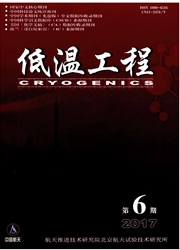

 中文摘要:
中文摘要:
建立椰壳活性炭-甲醇吸附式制冷系统吸附床传热传质数学模型,应用该模型进行具有非平衡吸附特性的吸附床传热传质研究,利用数值方法对数学模型进行求解,讨论了吸附床在冷却过程中吸附剂温度、吸附速率、吸附量、制冷系数以及单位质量吸附剂制冷功率与时间的关系,吸附床在加热过程中吸附剂温度、脱附速率及脱附量与时间的关系。研究结果表明:吸附床在整个吸附过程中的吸附速率存在一个峰值0.0012kg/s,吸附床在整个脱附过程中的脱附速率存在一个峰值0.0017kg/s,吸附剂温度变化率在换热阶段趋于平缓,制冷系数值在吸附阶段近似呈线性增长,而单位质量吸附剂制冷功率在吸附阶段存在一个峰值35kW/kW。
 英文摘要:
英文摘要:
To investigate the heat and mass transfer process inside the active carbon-methanol adsorption bed, model was established. Mathematical models were solved by numerical method, the relation between adsorption temperature, velocity of adsorb, adsorb quantity, coefficient of performance or adsorption coefficient of performance and time in adsorption bed were discussed during the period of cooling. Furthermore, the relation between adsorption temperature, desorption velocity or desorption quantity and time of adsorption bed were discussed during the period of heating up. It indicates that adsorb velocity has a peak value of 0. 001 2 kg/s in whole adsorbing stage, the same to desorption velocity of a peak value 0. 001 7 kg/s in desorption stage. The temperature variety rate of adsorption bed tends to flatness, the coefficient of performance value looks like to present a line growth in whole adsorbing stage and the adsorption coefficient of performance value has a peak value of 35 kW/kW in whole adsorbing stage.
 同期刊论文项目
同期刊论文项目
 同项目期刊论文
同项目期刊论文
 期刊信息
期刊信息
